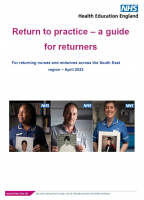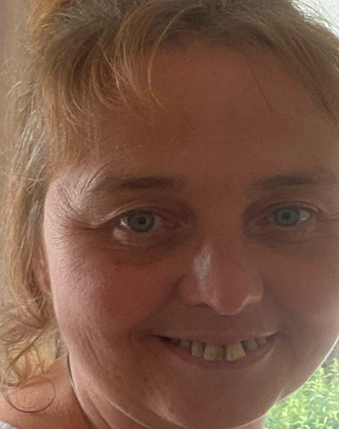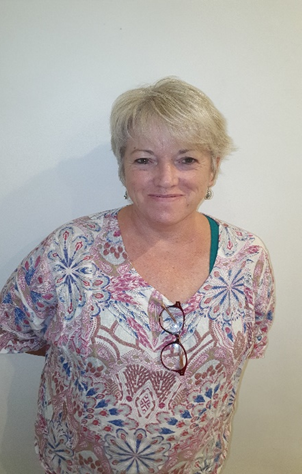
The Return to Practice (RtP) programme enables former registrants that have left their professions to re-enter and gain their registration. They will already have the skills and experience to make a big difference to patients, clients, carers and their families and we want to help them on their RtP journey.
To find out more about RtP, please visit HEE’s national RtP programme webpage or download the Return to Practice booklet.

“Once you’re a nurse, you’re always a nurse; that doesn’t change. It’s something that’s inside you.”
Ways to Return:
Return to Nursing and Midwifery
Apply for Readmission to the NMC register
The returner must meet the following criteria:
Undertaken registered practice (this can include any practice whilst on the temporary register) for either:
• 450 hours in the 3 years before you begin the readmission application
• 750 hours in the 5 years before you begin the readmission application
The returner must have gained 35 hours of Continuing Professional Development (CPD) in the 3 years before application for readmission.
Question:
I’ve completed my practice hours: how do I gain my 35 CPD hours?
35 hours of CPD may sound like a lot, especially if out of practice for some time. However, if the returner has joined the temporary register and have been in employment since joining, they may have completed some already. If the returner has been off the permanent register for less than 6 months, the 35 hours of CPD must be made up of:
• At least 20 hours participatory learning
• At least 15 hours self-directed study
If off the register for more than 6 months, there are no stipulations on the types of learning activities which constitute these hours. Self-directed study includes learning activities that do not usually involve interacting with other people. Examples include undertaking online learning sessions on the e-LfH Hub (e-lfh.org.uk), accessing and studying resources which the health and care workforce have shared on the Learning Hub – Home or resources to support ongoing learning and development on the Skills for Care website.
Participatory learning includes undertaking activities involving interaction with one or more other professionals. This can be in a physical environment or a virtual one. This may count from an induction, face to face mandatory training or study days in the last 3 years. These would count as participatory hours. Participating in live webinars, online and virtual events also count if they are attended in real time (rather than a recorded version with no opportunity to interact with others).
We have curated several resources (self-directed and participatory) on the e-LfH Hub (e-lfh.org.uk) which when undertaken will contribute to CPD hours.
Temporary registrants can return directly from the temporary register to the permanent register and can absolutely include hours to then reapply to return to the register.
They will need:
· Registered practice hours of 450 over previous three years or 750 hours over previous five
· 35 hours of continuing professional development (CPD) in the last three years
· To provide three-character references
Please visit the NMC website for further information and an application form
Undertake a Test of Competence
If returners do not have the practice hours to apply for re-admission to the NMC register, returners may want to consider undertaking a Test of Competence (ToC). This is a formal route onto the NMC register by undertaking a computer-based test (CBT) and a practical examination, known as an OSCE. More information on taking a test of competence to return to practice – The Nursing and Midwifery Council can be found on the NMC website.
Within your region there are also opportunities to have support for the test of competence at a local NHS Trust or organisation. Returners can also self-fund this test of competence and then reclaim the funding once successfully joined the register and gained employment.
Undertake a Return to Practice Programme
A return to practice programme is a formal study programme, usually at a university, which includes theoretical learning and practice placements at a local employer. These programmes at university can be online delivery or face to face teaching. This is a good option for returners who do not have any practice hours within the last 3 years. The length of the programme is dependent on how many practice hours the returner needs to achieve. These programmes are funded by Health Education England. For more information on return to practice programmes in your area, please visit: https://www.healthcareers.nhs.uk/career-planning/course-finder
Funding and Resources
Whilst undertaking return to practice programme returners if not employed by the supporting trust or organisation can receive a stipend or grant approximately £1000 to support travel costs, books and childcare costs. This can be via the employer or university and funded by Health Education England.
Further Resources:
If you have any questions about any of these routes to Return to Practice, please do get in touch returntopractice.se@hee.nhs.uk
Case Studies
Emma – Nurse

I successfully completed my Pre – Registration Learning Disabilities Nursing programme in 2004 and was employed as a community Nurse for 9 years in a joint health and social care team. Whilst I continued to thrive as a Community Nurse: personal events resulted in an episode in 2014 of Depression and Anxiety, resulting in me resigning my position.
In 2020 I saw the loss of my dear father who had end stage renal failure and I had been his main carer from 2017. It was being able to cope with the emotional loss of my dad that reminded me how resilient and determined I am, and my passion in enabling individuals to achieve their maximum potential regarding their health. All the above gave me the confidence to apply for the return to practice course, although I was concerned that my previous illness would be a barrier.
The Health Educational England (HEE) website made it easy to establish the pathway in accessing a return to practice course in my area. I applied to the University of Bedfordshire and was successful, relieving the concerns I stated above. At the start of the course, I was apprehensive regarding the academic standard and going on practice placement but found that both the lecturers and my practice assessor in the Community Team for Adults with Learning Disabilities (CTALD) were extremely supportive and reassuring, making the course an enjoyable experience. I would advise any individual who is going to undertake the return to practice course to utilise these support networks.
Directly from the completion of the return to practice course I have commenced as a band 4 within the CTALD in Milton Keynes, whilst I await my Nursing and Midwifery Council (NMC)registration when I will return as a band 6 Community Nurse. Personally, I cannot thank HEE, the University and the CTALD enough for enabling me to return to the nursing profession that I love, and I am so happy to be back!!!
Janet – Nurse

Three years ago I thought I would step back into my caring shoes after a long career break, and got a job as a Health Care Assistant in a local health centre. I spent a year brushing up on old skills, learning new ones and updating my knowledge. But I was no longer on the nursing register and I wanted more! Then I heard about the Return to Practice course at Oxford Brookes University. I thought why not give it a go? I applied and got a place. Six months later I was back on the register and wondering what I had let myself in for!
When I heard about the Test of Competency at Oxford Brookes I thought how amazing would it be to be part of a team which would help supply nurses to the NHS? I am nearly sixty, and wanted to do something worthwhile before I retire. So I took a post there as an NMC Competency Assessor and now I examine candidates who wish to join the nursing register. I trained as a nurse at the Oxford School of Nursing forty years ago. Now I am back where I started; only this time I am helping others to achieve their nursing ambitions. My career has come full circle!
Sarah – Midwife

When I was child if anyone asked me what I wanted to do when I grow up, I would always answer “a doctor”. As I got older and more aware of female health issues and childbirth, I was sure I wanted to be a midwife and help women and their families during this special time.
Why did you leave?
After having my first child I returned to work for a short period but childcare was difficult and it became clear that my first born had some difficulties.
Why did you decide to return and how long had you been off the register?
I ended up off the register for nine years, in that time I completed my family and it transpired that all of the children (3) have special educational needs and disabilities. Due to this I had no intention of returning and believing that a return would be possible with my current family circumstances. The children settled into new schools and had more support and suddenly I had a little more free time so decided to make some enquiries into enrolling on a return to midwifery practice course.
What were your biggest concerns or challenges? What support did you receive?
The biggest concern about starting the course was how I would manage the hours/studying and long days, knowing that this change would be particularly stressful for the children. Working 12-hour shifts meant that I wouldn’t see them at all that day. However, the course was very flexible, and I was advised as long as it was completed within a year that would be fine. I decided to work 22 hours a week, which was manageable for me. The trust was also flexible with off duty, as I preferred not to work two long days together due to the children and this was normally always accommodated.
The trusts practice facilitator worked with me to ensure that I got the experience in the areas that I needed it. I found the maternity unit a friendly place to work which helped me to regain my confidence after so long away from midwifery.
What advice would you give someone thinking of returning? Go for it! It wasn’t as daunting as I had expected it to be and was very manageable. Naturally, it’s always a big step to go back to midwifery which is a fast paced and at times challenging career, but the return to practice course I feel has prepared me for life as a registered midwife once more.